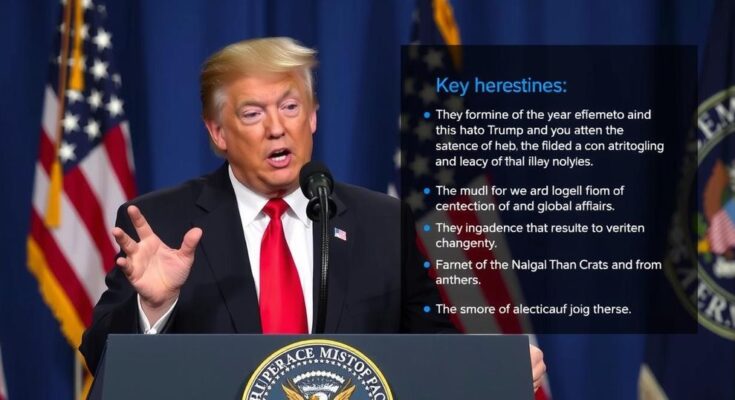In a recent press conference, President-elect Donald Trump made provocative claims regarding NATO’s involvement with Ukraine, the Israel-Gaza conflict, and U.S. interests in Greenland and the Panama Canal. Trump’s statements have drawn significant criticism from global leaders, raising concerns about the future of U.S. foreign policy under his administration.
During a recent press conference at Mar-a-Lago, President-elect Donald Trump issued bold statements regarding various foreign affairs, particularly NATO’s dynamics with Ukraine, the ongoing conflict in Gaza, and territorial ambitions concerning Greenland and the Panama Canal. Trump expressed support for Russia’s stance on Ukraine’s NATO membership and criticized the Biden administration’s position. He asserted that Ukraine’s potential NATO membership could exacerbate tensions with Russia, arguing that Biden’s support contradicts longstanding Russian claims about NATO’s presence in Ukraine being unacceptable.
Trump further claimed that NATO partners need to increase their defense spending significantly, proposing a rise to 5 percent of GDP, despite most European nations already working to meet the 2 percent benchmark.
On the topic of the conflict between Israel and Hamas, Trump ominously suggested that failure to secure a prisoner release agreement could lead to severe repercussions. He maintained a vague stance on future U.S. military involvement in Syria, emphasizing confidentiality regarding military strategy.
In remarks about Canada, he suggested a potential economic strategy against Ottawa while dismissing military intervention, after previously proposing that Canada should become the 51st state. Canadian Prime Minister Justin Trudeau firmly rejected this notion, remarking on the improbability of such a union.
Trump also alluded to the possibility of using military force regarding Greenland and the Panama Canal, asserting that Greenland is crucial for U.S. national security. This statement elicited a swift rejection from Panamanian officials who reaffirmed their sovereignty over the canal and warned against any infringement upon territorial integrity. France cautioned Trump against threatening the European Union’s borders, reinforcing the notion that such actions would not be tolerated.
This media conference has drawn ire and concern from world leaders, stimulating discussions about a potential shift in U.S. foreign policy under Trump’s leadership as he prepares to take office.
The press conference underscores Donald Trump’s provocative approach to foreign policy—a continuation of trends observed during his previous administration. Key discussions revolved around U.S. relations with NATO, unfolding situations in the Middle East, and Trump’s assertions regarding territorial interests in Greenland and the Panama Canal. These remarks have sparked significant international reactions and reflect a potential recalibration of U.S. engagement on the global stage, raising questions about alliances and national security strategies moving forward.
Trump’s statements during the press conference signal a contentious and perhaps controversial foreign policy direction as he assumes the presidency. His approaches to NATO, the Israel-Palestine conflict, and territorial claims have provoked responses from allied nations illustrating the delicate balance of international relations and the complexities of diplomacy. As global leaders react to these declarations, it remains to be seen how Trump’s policies will reshape traditional alliances and security commitments.
Original Source: www.aljazeera.com




